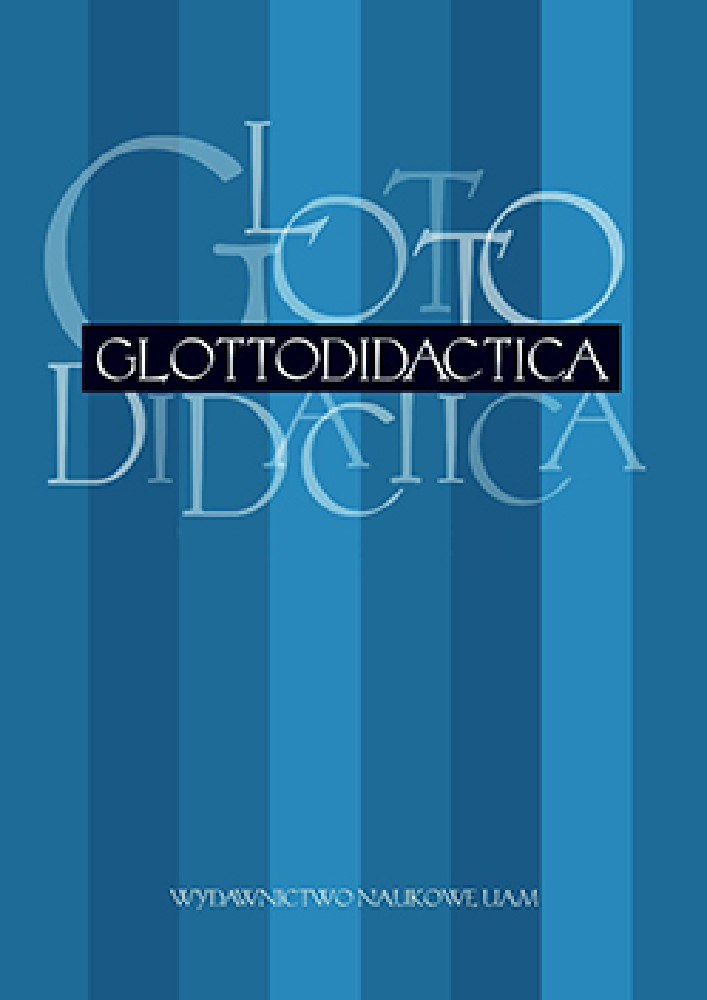Abstract
The aim of this article is to describe the issue of effective vocabulary learning among the students of neophilological faculties as well as to provide an answer to the question on how to learn vocabulary effectively. To achieve this aim, two vocabulary learning strategies (the key-word method and learning by heart) were compared on the basis of empirical research. Moreover, the vocabulary learning style of the informants was described, the conclusions were drawn and recommendations given.Literaturhinweise
Börner, W., 2000. Didaktik und Methodik der Wortschatzarbeit: Bestandsaufnahme und Perspektiven. In: Kühn, P. (Hrsg.). Wortschatzarbeit in der Diskussion. Germanistische Linguistik Bd. 5, 29–56.
Cudzich, B., 2010. Effiziente Wortschatzarbeit im fortgeschrittenen Fremdsprachenunterricht? Das Fallbeispiel DaF-Studium in Polen. Unveröffentlichte Magisterarbeit. Adam Mickiewicz Universität. Poznań.
Engelkamp, J., 1991. Das menschliche Gedächtnis. Das Erinnern von Sprache, Bildern und Handlungen. Göttingen: Hogrefe.
Friedrich, H.F., Mandl, H., 1992. Lern- und Denkstrategien. Analyse und Intervention. Göttingen: Hogrefe.
Koeppel, R., 2010. Deutsch als Fremdsprache – Spracherwerblich reflektierte Unterrichtspraxis. Baltmannsweiler: Schneider Verlag Hohengehren.
Meara, P., 1996. The vocabulary knowledge framework. <http://www.lognostics.co.uk/vlibrary/meara1996c.pdf> (17.08.2011).
Morfeld, P., 1998. Wissend lernen = effektiver lernen? Vokabellerntraining im Anfängerunterricht Englisch an der Volkshochschule. Tübingen: Gunter Narr Verlag.
Neuner-Anfindsen, S., 2005. Fremdsprachenlernen und Lernerautonomie. Sprachlernbewusstsein, Lernprozessorganisation und Lernstrategien zum Wortschatzlernen in Deutsch als Fremdsprache. Bd. 1., Baltmannsweiler: Schneider Verlag Hohengehren.
Neveling, C., 2004. Wörterlernen mit Wörternetzen. Eine Untersuchung zu Wörternetzen als Lernstrategie und als Forschungsverfahren. Tübingen: Gunter Narr Verlag.
Oxford, R.L., 1990. Language Learning Strategies. What Every Teacher Should Know. Boston: Heinle & Heinle.
Paivio, A., 1971. Imagery and Verbal Processes. New York: Holt, Rinehart & Winston.
Pethes, N., Ruchatz, J., 2001. Gedächtnis und Erinnerung. Ein interdisziplinäres Lexikon. Hamburg: Rowohlt Taschenbuch Verlag.
Rampillon, U., 2003. Better in Englisch. Unterrichtshilfen für Lehrer und Eltern. Hannover: Impressum.
Stork, A., 2003. Vokabellernen. Eine Untersuchung zur Effizienz von Vokabellernstrategien. Tübingen: Gunther Narr Verlag.
Thornbury, S., 2002. How to teach vocabulary. Harlow: Longman.
Wenden, A., Joan, R. (Hrsg.), 1987. Learner Strategies in Language Learning. Englewood Cliffs: Prentice Hall.
Wilczyńska, W., 1999. Uczyć się czy być nauczanym? O autonomii w przyswajaniu języka obcego. Warszawa–Poznań: Wydawnictwo Naukowe PWN.
Wilkins, D., 1972. Linguistics in Language Teaching. London: Edward Arnold.
Zimmermann, G., 1997. Anmerkungen zum Strategienkonzept. In: Rampillon, U., Zimmermann, G. (Hrsg.). Strategien und Techniken beim Erwerb fremder Sprachen. Ismaning: Hueber, 95–113.
Lizenz
Authors
Authors of texts accepted for publication in Glottodidactica are required to complete, sign and return to the editor's office the Agreement for granting a royalty-free license to works with a commitment to grant a CC sub-license.
Under the agreement, the authors of texts published in Glottodidactica grant the Adam Mickiewicz University in Poznań a non-exclusive, royalty-free license and authorize the use of Attribution-NoDerivatives 4.0 International (CC BY-ND 4.0) Creative Commons sub-license.
The authors retain the right to continue the free disposal of the work.
Users
Interested Internet users are entitled to use works published in Glottodidactica since 2016, under the following conditions:
- attribution - obligation to provide, together with the distributed work, information about the authorship, title, source (link to the original work, DOI) and the license itself.
- no derivatives - the work must be preserved in its original form, without the author's consent it is not possible to distribute the modified work, such as translations, publications, etc.
Copyrights are reserved for all texts published before 2016.
Miscellaneous
Adam Mickiewicz University in Poznań retains the right to magazines as a whole (layout, graphic form, title, cover design, logo etc.).




